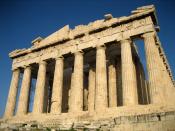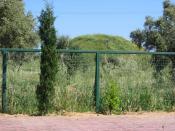In 490 B.C.E. the Battle of Marathon was a brief but important event in the war between the Greek city-states and The Persian Empire. The results of the battle had unforeseen effects on Athens and the future of Western Civilization. The Greek 'Golden Age', centred in Athens, brought about new forms of art, the foundations of future philosophy and redirected literature and drama. The achievements of the Athenians during this period were directly connected to the inspiration and prestige (which later translated into power) fuelled by the events at Marathon. How the events of a single day changed the entire course of Western Civilization is hard to fathom but obvious when one looks at the aftermath of that fateful event.
The revolts of a few Greek cities of Ionia were what initially sparked the Persians interest in Athens, Attica and the Peloponnese. When Athens sent a small fleet in support of the Ionian rebels they immediately gave Persia a new target for further expansion.
The failure of the revolts and the ruin of Sardis and Miletus shocked the Greek world. The Persians now thought, "if Miletus had been the glory of subject Greece, Athens was the golden gate to free Hellas. A bauble, perhaps, beside the treasures of the empire, but a tempting one." Now not only did the Persian king Darius want revenge against the Athenians he wanted the entire Greek world to be integrated into the Persian Empire.
In 490 BCE Darius finally advanced towards Greece. After the capture of Eretria, confident of their success, the Persians sailed on to Attica; and under the advice of Hippas* landed at the bay of Marathon, 26 km north east of Athens. When the Athenians received news of the Persians landing, they sent a runner (Philippides) to Sparta asking for support.


